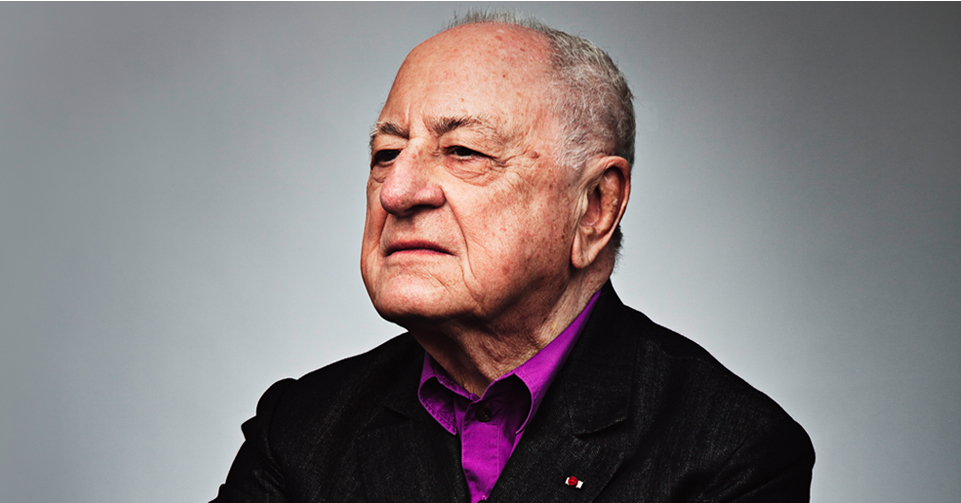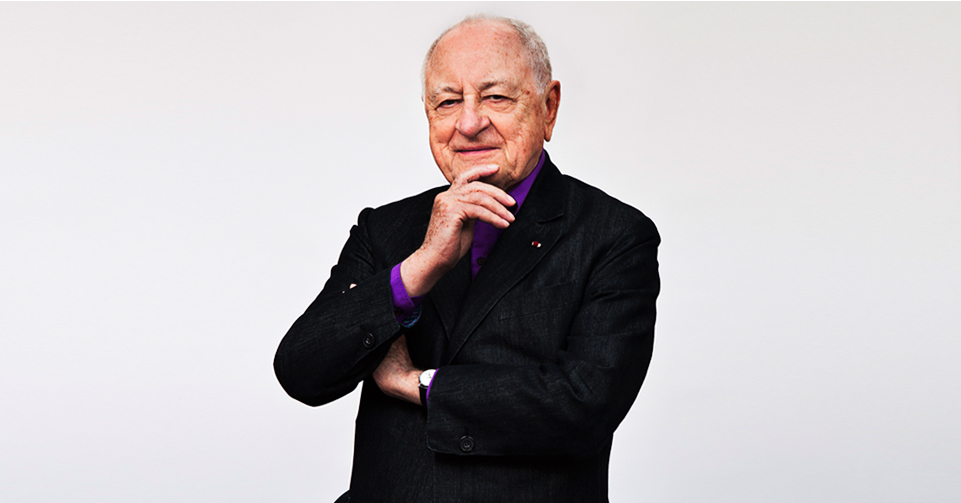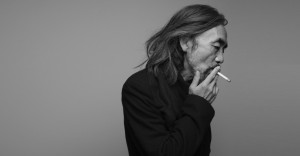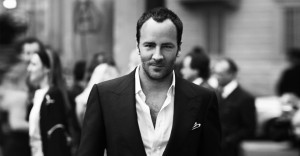Mr. Bergé, is it true that you met Yves Saint Laurent for the first time at Christian Dior’s funeral in 1957?
Well, you can see us both in a picture that shows the mourning guests, but in fact I met him on February 3, 1958 during a dinner organized by Marie-Louise Bousquet. I had come to congratulate him a few days after his first collection at Dior was presented. We were living together six months later.
What was it about that encounter that stuck with you?
I didn’t know very much about fashion at that time. I was a very close friend of Christian’s and of some other haute couture masters like Balenciaga, but for me fashion was not an art. In my eyes, it was just something to make money. But the morning of his first show at Dior I understood that something happened with me. I realized that I was stupid. I loved what I saw and I just knew that Yves Saint Laurent would be a great fashion designer.
After Yves Saint Laurent got fired from Dior for refusing military service in Algeria, you founded his eponymous fashion label with him and acted as the CEO for over 40 years, a very long and successful partnership.
We had a Berlin Wall between us. I never interfered with his creative design for commercial reasons and he never came to me to talk about money. Ever.
Money wasn’t important to Yves Saint Laurent?
No. Because he trusted me and also of course because he knew that he had money. But he never knew how much he had. Never. Money for him was something strange.
Perhaps that’s the reason you ended up with such an amazing art collection. Were you able to simply buy anything that you liked without second–guessing?
Well, it was not so easy, not in the very beginning. When we started our business we didn’t have money, but later on money was not important enough for us to not spend it on art. We were very proud of the collection that we created.
You sold it in the biggest private auction ever for €373,500,000 after he died. Why did you sell it if it was so important for you both?
When I decided to sell the collection after Yves died, it was not only a nostalgic decision, but also a money decision. But the money was not for me. As you might know, we have a foundation that needs money and a big part of that sale went to the foundation. I am involved in many, many endeavors, like fighting against AIDS, supporting theaters, and many other things. I decided to sell the collection mainly for that reason – to have money for those purposes.
Were you with him the moment he died?
Of course. I had decided to go to Montreal for a weekend to visit an exhibition when I got a call from the doctor. He said that it was a question of maybe one or two weeks. Before and after that, I sat by his side.
He had brain cancer. Did Yves Saint Laurent know that his death was approaching?
Not at all. He never knew. The doctor told me that there was nothing more to do and we mutually decided that it would be better for him to not know. You know, I have the belief that Yves would not have been strong enough to accept that.
How did you feel when he wasn’t there anymore?
It is so difficult and almost impossible to describe. But you might have also experienced that in your life: it is very different if someone passes away suddenly, by an accident or a stroke or after a long illness. I was kind of expecting it and that helped me to be prepared for this big loss.
Are you sad that you don’t work in fashion anymore? Do you miss the business aspect since you retired together with Yves Saint Laurent?
No. Probably because the fashion industry was not exactly the same in the past. I am not nostalgic – I hate nostalgia – but I am happy that I don’t work in the fashion business today. I am sorry to tell you, but it is not very easy to work with fashion magazines now.
Why is that?
With Saint Laurent, we never talked money, we never traded a front cover against advertising, we never talked about that. Never. Let me tell you something: we opened the Couture House in ’62 and in 1963 we were already on the front covers with full pages inside. Do you think that is possible today? Even with a new Saint Laurent?
Would Yves Saint Laurent hate the fashion industry of today?
Of course! Yves retired at the right time and he died at the right time. I am sorry to tell you that, but it is very difficult for me to understand what has happened to the fashion business. It is all a question of money and marketing. We never talk about talent – it’s not the point. We only talk about sales. Yves Saint Laurent would have hated that.
What would you say was his biggest achievement in fashion? Especially in the ’60s, Yves Saint Laurent and the whole company around him really pushed into a new direction.
Saint Laurent is, along with Chanel, the most important fashion designer of the 20th century. It was a different time of designers, a time of great masterminds. I’ve seen wonderful dresses by Balenciaga and Christian Dior – but the difference between those fashion designers and Chanel and Saint Laurent is that they stayed on the aesthetic field. Saint Laurent and Chanel went to the social field – they changed the lives of women around the world.
Because of what exactly?
Chanel gave liberty to the women; I think Saint Laurent gave them power. We can see that today, everyday.
Everyone considered him a genius and he became more and more intense in his way of working and living. Why do you think he became addicted to drugs and alcohol in the mid-seventies?
It is very difficult to answer what lead to this addiction. But I must admit that Yves created wonderful collections while using drugs and alcohol. That made it very difficult to stop.
Was he always creating?
Always. He didn’t really pay attention to anything else – or anybody else. Marcel Proust explained that very well: he said that if you are a genius you are busy with yourself – and it is true. Voilà.
Yves Saint Laurent was often described as a depressed person and even in his retirement speech he said, “I’ve gone through much anguish, many hells; I’ve known fear and tremendous solitude; the deceitful friends that tranquillizers and narcotics turn out to be; the prison that depression can be and that of mental health clinics.” But wasn’t Yves Saint Laurent someone who achieved everything? What could it have been that made him so sad?
I think he was born with depression. And later he suffered of fame because he realized that it didn’t bring him anything.
Would you call Yves Saint Laurent – that genius admired by so many millions – a tragic person in the end?
Saint Laurent was an artist. And an artist always plays with his internal reality. You have to know the rules of the game – and I was able to deal with it very well. We had a lot of happy moments.
When was he the happiest?
He could be hilarious among friends. But I think he was the happiest when he finished a collection and took the applause and the standing ovations. After that his mission was finished. It was like a firework – and then it started all over again.
Return to Top

Short Profile
Name: Pierre Bergé
DOB: 14 November 1930
Place of Birth: Île d'Oléron, France
Occupation: Former CEO of YSL





















Great interview.
I hope you guys had as much fun as me reading the article.
His influence deserves to be separated from Dior and Balenciaga and spoken about with Chanel.
Needless to say that it’s an amazing interview, so revealing and moving, really describing what made Saint Laurent so special as a personality. He was a huge talent, ‘one’ that we would wish to see sometime in the future, making once again a breakthrough in the world of fashion, reconnecting art with fashion! We need another Saint Laurent to be born!
Amazing interview, enjoyed it so very much. YSL is truly missed.
Appreciate the sincerety of Berge’s answers and the transparency within their relationship.
two hearts beat as one, complementing each other in style and grace,though the wormhole of life in which one is left behind to live for both of them.may you carrie on pierre and keep in mind of all of those who think of you and feel the pain of your loss. i will say a prayer for you. dene
shine on you crazy diamond, what a wild ride you’ve been able to travel on. reflect on all of what life has given you.
What a beautiful interview, YSL will always remain an inspiration, with its art and as a business model.
I flew to Denver the last weekend of his retrospective and it was a dream come true I will always believe he is my favorite designer…